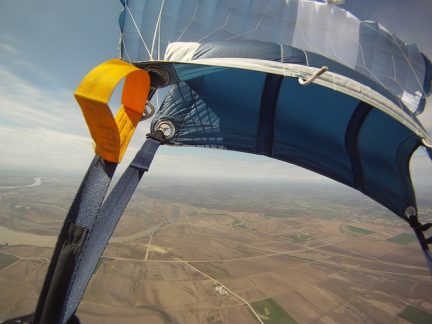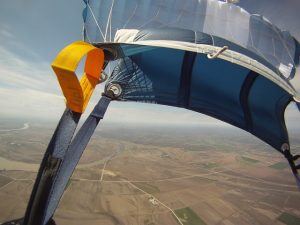Skydiving prevents depression?


Last modified: 29-03-2020
French scientists based on skydivers research published in 1999, found that sensation seeking can be an adaptive response to anhedonia, ie. an inability to experience pleasure.
The creator of the theory of sensation seeking stated that the physiological basis of sensation seeking is the optimal level of arousal – in patients that achieve high scores in this scale the optimal level of excitation is higher. Previous studies on the relationship between sensation seeking and emotional deficits (eg. anhedonia, blunted-effect) the authors concluded that high levels of sensation seeking may be considered as a desire to provide experience and compensate for anhedonia resulting from too low arousal.
In the study, which I’m describing here, the researchers chose a group of 22 skydivers, who generally have higher levels of sensation seeking, and a control group. Each skydiver jumped regularly for at least two years. The subjects had to fill out some questionnaires and then complete the task, during which they were connected to an electroencephalograph (EEG). The task was looking at a white square on the screen and pressing a button when they see the yellow square (stimulus significant), but not pressing when they see the red square (stimulus insignificant). There were two conditions for the tasks that differed in frequency of significant and insignificant stimuli. Using the results of EEG, the researchers then measured the amplitude of the potential P3 in the frontal and parietal cortex.
User surveys have shown that parachutists had higher level of emotional deficit. At the same time, nor any jumper or nor anyone from the control group suffered from depression. Skydivers showed negative correlation between sensation seeking and hyperactivity and lack of control, ie. the higher the score they achieved on the scale sensation seeking, the more they were balanced. In the control group, however, the higher the score they get on the novelty-seeking scale, the more hyperactive they were and showed less control. EEG showed that skydivers have larger amplitude of the potential P3, than the control group, but only in response to insignificant stimuli, which required more automatic processing. Since the amplitude of P3 is known as the indicator of so-called orienting response it can be suggested that skydivers have developed the ability to respond automatically to any stimulus, also insignificant.
Orienting response occurs during recognizing news and any apparent change in stimulus. Many scientists believe that it is the result of a sudden increase in non-specific activation of reticular formation or thalamus.
Unusual response to the insignificant stimuli may be interpreted as strengthening adaptive procedure, which involves the use of each stimulus as the stimulant. It can be suggested that skydives are adaptive form of behavior that contributes to the development of the orienting response. In previous studies, the same researchers showed that in people with depression who also show an inability to experience pleasure and blunted-effect, we can observe the opposite effect to that observed in skydivers – persons with depression have lower amplitude of the potential P3. People who show emotional deficits have two choices: they can let it take root and (over time or as a result of an event) develop into a depression or respond by developing some adaptive forms of behavior to compensate for the deficit. Risky activity is one such possible adaptive behavior. This is confirmed by the fact that the jumpers who have the highest scores on a scale of experience seeking, at the same time have the lowest rates of hyperactivity and lack of control. Their sensation seeking is not impulsive behavior resulting from a lack of control.
The opposite results regarding the orienting response (amplitude P3) in two groups of people with emotional deficits: in people with depression and at skydivers suggest that the P3 amplitude reflects the ability to undertake activities that enhance the orienting response. Such activities are undertaken to compensate for the deficit and improve well-being. People with depression may not have such capacity.
References
Pierson A., Le Houezec J., Fossaert A., Dubal S., Jouvent R. (1999). Frontal reactivity and sensation seeking. An ERP study in skydivers. Progress in Neuro-Psychopharmacology & Biological Psychiatry, 23(3), 447-463.
Author: Maja Kochanowska






Add comment